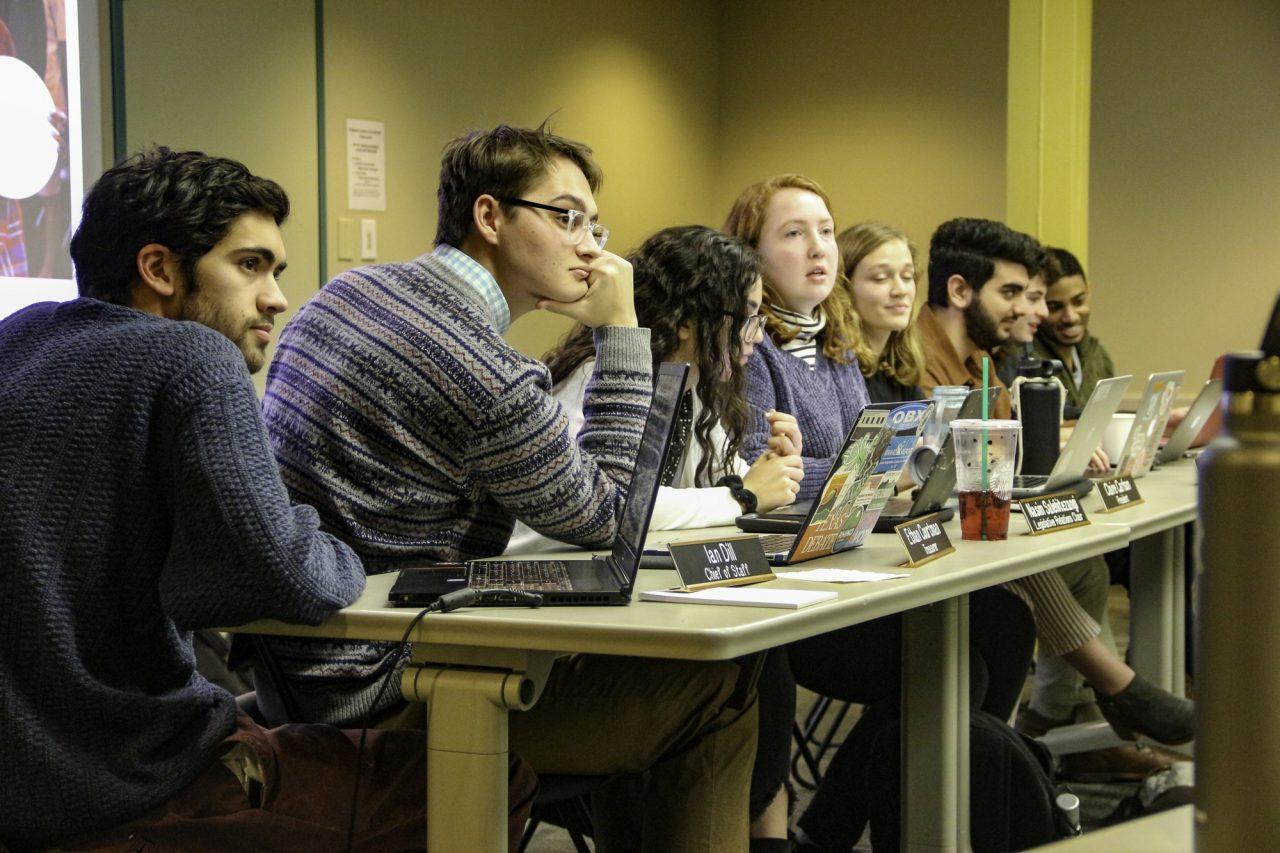Photo by Martina Almeida
In 2013, Student Government Association (SGA) transitioned from an academic-year to a calendar-year term and approved the changes through a student body vote.
This week, in a reversal of that 2013 amendment, SGA has changed their election timeline, has given seniors an extra semester of voting power and has removed the senator emeritus position, all without student body input.
At their meeting on Wednesday, voting members of SGA explained that the alteration was cosmetic, as opposed to a change in content, and therefore didn’t require a student body vote, according to their constitution.
The reason for the vote was to approve the new election schedule implemented by Student Involvement for student organizations, which will be implemented in May. Since 2013, student government representatives have been elected in the fall to begin a calendar-year term the following semester.
However, with this update, senators will now be elected in the spring and will begin an academic-year term the following fall semester. This vote changes more than just when senators campaign and are elected: It also gives senior senators an additional semester of voting power and removes the position of senator emeritus.
In SGA’s constitution, cosmetic changes are described as “minor stylistic updates that do not change the actual content of the document,” in which case can be made if the changes are supported unanimously by the senate.
Sophomore senator Oliver Chapin-Eiserloh is the chair of SGA’s constitutional review committee and initially presented the amendments to the senate at last week’s meeting, alongside junior and committee member Leopoldo Perez.
At the time of the initial presentation of the amendments, SGA overlooked the part of the constitution that requires one week between amendment presentation and voting. Because of that, the senate held another vote at this week’s meeting, which passed unanimously.
Chapin-Eiserloh explained that the senate saw the changes as cosmetic since Student Involvement suggested the vote.
“When we came down to it, what we understood the change to be is an extension of term limit, basically,” Chapin-Eiserloh said. “The term is the same length it’s just that the dates are shifted. We feel that, because it’s not changing the length of any senator’s term, it’s just shifting at a semester later for seniors. There’s still only voting for two semesters, just shifting it later.”
The change also eliminates the advisory positions of the president-appointed senator emeriti since those graduating seniors will now have voting power.
At the Feb. 12 meeting, sophomore vice president Georgia Roberts also saw the change as cosmetic.
“I personally do think it’s cosmetic. I think that basically what we’re doing is fixing it so that all the classes will have a voice, and it honestly makes more sense,” Roberts said.
In an interview with the Trinitonian, David Tuttle, dean of students and an adviser to SGA, agreed.
“[SGA is] just trying to restore what was kind of the status quo before, which was you would have sophomore junior and senior senators, and as early as possible first-year student senators, so I don’t think it’s offering any advantage or not,” Tuttle said. “And I don’t know what the alternative would be. I can’t imagine seniors being happy with not being represented when they’re on campus.”
At the initial meeting, Perez explained he was hesitant about the change, specifically the aspect of it that removes the position of senator emeritus.
“To comment on the senator emeriti part, I kind of do agree it’s a bit more important. However, it kind of feels like we’ve been overruled, like this isn’t us specifically being overruled, but as a whole, since we now have this whole new schedule,” Perez said. “It’d be weird if we cut that out, a senior voice in SGA.”
Though Perez expressed concern of feeling forced to make the change, at this week’s SGA meeting, some of that was clarified. Jamie Thompson, SGA adviser and director for Student Involvement, explained the change was more of a request from the Office of Student Involvement than a mandate.
“The change is based on feedback from student organizations. Already 20 to 25 percent of the groups had, on their own, switched back to an academic year, and in total, a lot of anecdotal feedback, student groups said the calendar year was not helpful or successful for them,” Thompson said. “It is a shift we’re making. It works best when everyone does it together.”
In an email to student leaders, coordinator for Student Programs Shannon Twumasi explained that “Student Involvement expects [student leaders] to review, amend and modify [their] current constitution” using a template provided by. Student Involvement, which includes that “officer elections will take place in March of each academic year.”
Junior Claire Carlson, president of SGA, acknowledged that, though at the request of Student Involvement, the election schedule change was ultimately driven by student organization members.
“It’s something that is like occurring, whether or not we touched the constitution. Like, this change is going to happen regardless. It’s simply us making reflection of the constitution that was inherited to us,” Carlson said.
Elections for sophomores, juniors and seniors will now be in April, though first-year elections will be in October.













